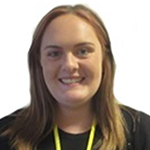Explain why you decided to pursue a career in this profession?
Having enjoyed studying actuarial science at university, it seemed like a natural step to continue to pursue a career down the actuarial route. I wanted to be able to use the mathematical and technical skills I’d built up during my studies, along with being able to communicate and work with lots of different people. Therefore, becoming a trainee consultant seemed like a good match. In my final year at university, I completed a pensions module and knew that this was the area I had the most interest in and, hence, I wanted to pursue a career in this area.
Give a bit of background on what you studied at Uni and the training/exams that you have completed or are working towards currently?
I decided to study Actuarial Science after attending an insight day with an actuarial firm whilst still at school. Knowing that I would hopefully pursue a career in this area, it seemed like the most fitting degree to help me develop the skills needed, along with also providing the opportunity to complete a placement year with an actuarial firm during my penultimate year to gain further insight into the career. Good performance during this degree also provided the opportunity to gain exemptions from the first six of the actuarial exams that have to be completed after university before you become a qualified actuary (there are 13 in total!). I have also completed lots of internal training whilst working to help improve my knowledge of the internal systems and models needed for my job.
Explain what your current role involves?
My current role is within the Actuarial Public team where we concentrate on LGPS pension funds. Over the past 10 months, I have had the opportunity to get involved with a range of projects across the firm. Some have been quite technical – including producing accounting reports which employers in the fund receive annually, fund employer work where we calculate the opening position of new employers who have recently joined the fund and reviewing the cessation surpluses or deficits which arise when employers leave the fund. Alongside this I have also been involved with drafting some reports and emails to clients, which has proved very beneficial for developing my communication skills.
What are your future plans for your career?
My main goal is to pass the actuarial exams and become a fully qualified Actuary – however long this may take! Alongside this, I want to continue learning and improving on the technical and communication aspects of the job as I hope to progress to become a consultant eventually, which involves being able to explain all the complex and technical calculations to a range of clients, including those who have experience in these areas and those who do not.
Any advice?
Definitely do some research into the career and consider the time and organisation required to balance both working and studying as this can be challenging – although the burden of this is slightly reduced with the study days provided by Hymans . To that end, I would also say to get involved with lots of things at university (like sports clubs or societies) as employers will want to see that you can organise and balance your time between studying and working. I would also recommend trying out a summer internship, placement or insight opportunity in your penultimate year of university as this can give great insight into some of the day-to-day elements of the role to see if the career is the right fit for you. Furthermore, this will also give you lots of great experience to talk about during any graduate level interviews you may have.





